 18 citations,
December 2021 in “Foods”
18 citations,
December 2021 in “Foods” Seaweeds contain beneficial compounds with potential uses in food, cosmetics, and health, but more research is needed to improve extraction and safety.
182 citations,
November 2018 in “Cosmetics” Seaweeds have beneficial compounds for skin care, including anti-aging and protective effects.
[object Object] 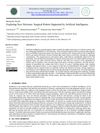
AI-assisted surgical robots improve surgery precision and safety.
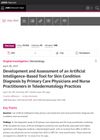 51 citations,
April 2021 in “JAMA network open”
51 citations,
April 2021 in “JAMA network open” The AI tool helped primary care doctors and nurse practitioners diagnose skin conditions more accurately.
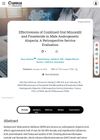
Combined oral minoxidil and finasteride significantly improve hair density in men with male pattern baldness.

The method creates realistic, anonymous acne face images for research, achieving 97.6% accuracy in classification.
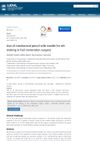 November 2023 in “Indian Journal of Dermatology, Venereology and Leprology”
November 2023 in “Indian Journal of Dermatology, Venereology and Leprology” Using a mechanical pencil to hold a needle makes hair transplant surgery easier and faster.
 January 2024 in “Biotechnology advances”
January 2024 in “Biotechnology advances” Bioassays help find useful compounds in nature for making medicines, supplements, and cosmetics.
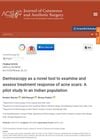 December 2024 in “Journal of Cutaneous and Aesthetic Surgery”
December 2024 in “Journal of Cutaneous and Aesthetic Surgery” Dermoscopy effectively assesses and improves acne scar treatments.
 December 2024 in “Indian Journal of Dermatology Venereology and Leprology”
December 2024 in “Indian Journal of Dermatology Venereology and Leprology” Atypical male hair loss may not respond to usual treatments.
 November 2024 in “Journal of Cutaneous and Aesthetic Surgery”
November 2024 in “Journal of Cutaneous and Aesthetic Surgery” Combining platelet-rich plasma and minoxidil can effectively regrow hair in severe alopecia areata cases.
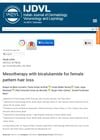 September 2024 in “Indian Journal of Dermatology Venereology and Leprology”
September 2024 in “Indian Journal of Dermatology Venereology and Leprology” Mesotherapy with bicalutamide has limited effectiveness for female hair loss.
 August 2024 in “Journal of Cutaneous and Aesthetic Surgery”
August 2024 in “Journal of Cutaneous and Aesthetic Surgery” Microneedling radiofrequency significantly improves hair growth with minimal side effects.
 July 2024 in “Indian Journal of Dermatology Venereology and Leprology”
July 2024 in “Indian Journal of Dermatology Venereology and Leprology” Certain gene variations in PITX2 are linked to a higher risk of male pattern baldness in Indians.

PRP injections did not significantly improve hair growth in men with androgenetic alopecia.

A 14-year-old girl with a condition that makes her hair easy to pull out also has a hair-pulling disorder, and treatment helped but she relapsed after a year.
 March 2024 in “Cosmoderma”
March 2024 in “Cosmoderma” Botulinum toxin is used for neck, shoulder, calf, and ankle slimming, and hair loss treatment, but can cause muscle weakness and atrophy with regular use.
March 2024 in “American journal of veterinary research” Clippers are the best tool for collecting dog hair for chemical tests, being fast and stress-free for the dog.
 4 citations,
January 2021 in “Dermatologic Therapy”
4 citations,
January 2021 in “Dermatologic Therapy” AI is effective in diagnosing and treating hair disorders, including detecting hair loss and scalp conditions with high accuracy, but it should supplement, not replace, doctor-patient interactions.
 August 2019 in “Research Square (Research Square)”
August 2019 in “Research Square (Research Square)” Certain long non-coding RNAs in cashmere goats affect hair growth when treated with a specific growth factor.
 September 2023 in “International journal of medicine”
September 2023 in “International journal of medicine” AI is revolutionizing healthcare by improving diagnosis, treatment, and monitoring, but still needs close supervision.
 August 2023 in “Journal of analytical & pharmaceutical research”
August 2023 in “Journal of analytical & pharmaceutical research” Microneedle-assisted therapy with human basic fibroblast growth factor significantly regrew hair in patients with hair loss.
 2 citations,
March 2011 in “Infertility”
2 citations,
March 2011 in “Infertility” The conclusion is that lifestyle changes and weight loss are first-line treatments for infertility due to anovulation, with various medications and assisted reproductive technologies as additional options.
[object Object]  2 citations,
March 2023 in “Frontiers in Bioengineering and Biotechnology”
2 citations,
March 2023 in “Frontiers in Bioengineering and Biotechnology” CuSi nanowires with NIR photothermal properties could effectively treat infected wounds and promote healing.
January 2025 in “International Journal of Pharmaceutics” The study developed a novel in situ thermosensitive hydrogel combining ionic liquid, cyclodextrin, and poloxamer for the co-delivery of minoxidil (MXD) and finasteride (FIN) to hair follicles, aiming to treat androgenic alopecia (AGA) synergistically. This hydrogel, termed M+F@ICPG, transitions from liquid to gel upon contact with the scalp, enhancing drug retention in the skin and reducing systemic toxicity. The formulation improves the solubility and targeted delivery of MXD and FIN, overcoming the stratum corneum barrier and providing synergistic effects by promoting angiogenesis, inhibiting 5α-reductase 2, and reducing inflammation. The efficacy of M+F@ICPG was demonstrated in a testosterone-induced AGA mouse model, suggesting it as a promising strategy for AGA treatment.
 September 2020 in “British Journal of Dermatology”
September 2020 in “British Journal of Dermatology” The document highlights advancements and findings in dermatology, including AI use, disease prevention, treatment efficacy, and the impact of conditions on patients' lives.
 125 citations,
December 2016 in “Molecules”
125 citations,
December 2016 in “Molecules” Substances from Chinese medicines show promise for immune support and disease prevention, but the way they are processed affects their effectiveness.
 2 citations,
November 2021 in “Frontiers in Medicine”
2 citations,
November 2021 in “Frontiers in Medicine” New skin imaging, teledermatology, and AI could become key in future dermatology care.
 1 citations,
March 2024 in “Skin research and technology”
1 citations,
March 2024 in “Skin research and technology” A new AI model diagnoses hair and scalp disorders with 92% accuracy, better than previous models.
 1 citations,
December 2022 in “JAMA Dermatology”
1 citations,
December 2022 in “JAMA Dermatology” The AI system HairComb accurately scores hair loss severity, matching dermatologist assessments.


























